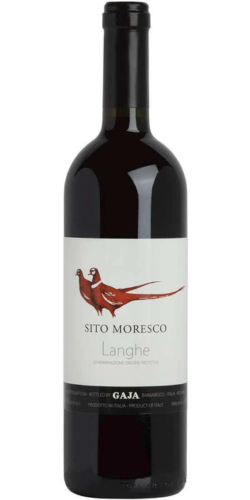
Our Rating

Piedmont
Nebbiolo
When most wine drinkers think of Gaja wines, they think of collectible bottles of fine Italian that must be cellared before enjoying. But, as this bottle proves, winemaker Angelo Gaja also crafts wines that can be enjoyed today, and will appeal to a range of palates, not just those familiar with his famous Nebbiolos.
Angelo Gaja’s impact on the legacy of Italian wine cannot be understated. Today, Italy is viewed as one of the world’s most respected wine producers, but this wasn’t always the case. When conversations turned to Europe’s premiere bottles, the world’s attention was almost always on France. Enter Angelo Gaja, a modernist in a country full of traditionalists.
Using small oak barrels, also known as barriques, during the aging process wasn’t really a thing until Angelo Gaja started doing it. So just how did barriques instead of larger barrels affect the wine? Because barriques hold 225 liters, or 59 gallons, compared to a larger barrel that will hold 300 liters or 79 gallons, the resulting wines were softer and had more pronounced oak characteristics. The most common tasting notes associated with oakiness are vanilla, spice, and a toasty quality.
The other significant impact of this was a richer palate, one that wine lovers around the world associated with a well-made wine.
As wine lovers, we are so used to seeing single vineyard wines from France or California that it’s hard to imagine a time when influential wine-producing countries like Italy didn’t produce them. For sippers who are newer to this conversation, single vineyard wines are wines made from grapes sourced from a single vineyard rather than blending grapes from one or more vineyards.
Crafting a single vineyard wine is a chance for a winemaker to highlight the unique characteristics of the terroir, the climate, and the growing conditions that affect the land. Angelo Gaja introduced the concept of single vineyard wines to Italy.
In 1978, Gaja made what his peers in the Italian wine community considered a sacrilegious decision: he planted Cabernet Sauvignon on one of the best sites for Nebbiolo in Piedmont, in a vineyard site called the Darmagi Vineyard. This unprecedented move – planting Bordeaux grapes in Italy’s revered Piedmont – wasn’t done because Angelo favored French grapes over native ones like Barbera, Nebbiolo, or Dolcetto, but he knew that wine connoisseurs would not give Italian wine the attention it deserved if he didn’t meet their palates halfway, as it were, and craft wines from varieties they knew, and in the oak barrels their tastes had been acquainted with.
The Sito Moresco Vineyard, which was once owned by the Moresco family, is a 25-acre estate whose vineyards are located in Treiso and Barbaresco. The soils here are sandy and exploding with chalky marl and sandstone, the former of which is responsible for the ground’s white appearance. While large commercial producers do have a toehold here, like the Gaja’s of the world, Barbaresco is dominated by smaller, boutique-sized brands.
The area around the vineyards of Sito Moresco is a patchwork of vineyards, hills, and forested land, and it’s filled with local flora and fauna. The addition of two ringed pheasants on the label art of this bottle was inspired by the presence of these noble game birds.
Gaja’s 2019 Sito Moresco is one of the brand’s most accessible wines. The bottling is a blend of native Piedmontese varieties Nebbiolo and Barbera and noble French grapes Merlot and Cabernet Sauvignon. The exact breakdown is 35% Nebbiolo, 25% Merlot, 25% Barbera, and 15% Cabernet Sauvignon.
Bright red fruit dominates the nose and the palate. Aromas of black cherry, strawberry, as well as rose and forest floor rise from the glass. Notes of sour cherry, red cherry, black currant, and lighter marks of graphite and old leather spread across the palate.
Unlike Gaja’s signature releases, this bottling does not necessarily need to be cellared before enjoying. It’s ready to enjoy now and paired with your favorite slow-braised meats, ragus, and root vegetables.
Gaja’s impact on the world of wine is undeniable, and his legacy continues to shape the industry to this day. It’s refreshing to see a producer like this continue to expand his range of wines and attract wine lovers who may have felt priced out of his other offerings. As the 2019 Sito Moresco demonstrates, Gaja hasn’t stopped innovating.
Italy
Piedmont
Nebbiolo
13.5%
Angelo Gaja
1 to 2 Hours
Now to 2030
Gaja
